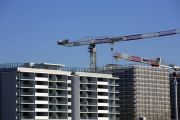
Looking for a safe haven in the trade wars? Come on in
Last Friday, one day into the global trade war, Oxford Economics undertook a long-scheduled presentation on the global outlook for commercial property.
The US recovery – the signs of which emerged late last year – would be dampened but not derailed, said Abigail Rosenbaum, an associate director in Oxford’s real estate economics team.

Tariff uncertainty, and a rise in US inflation, will ensure that the pricing recovery remains subdued in 2025 but “stronger momentum” will emerge in 2026 and 2027.
All forecasts are fraught. Particularly with world changing, recession inducing, but rapidly evolving events for which property is only a second or third order impact.
One week after the launch of the Trump trade war, and despite the hammering on the stock exchange, it is possible to find Australian experts in commercial property who, like Rosenbaum, are sanguine about the outlook.
Yes, the real estate stocks took another battering on Wednesday with the sector well in the red.
Goodman Group, the country’s largest, and most liquid, real estate stock, has lost 28 per cent of its value since the start of the year.
DigiCo Infrastructure REIT, floated by HMC Capital at $5.00 a unit in December to capture the excitement around data centres, has halved in price – and taken HMC Capital with it.
But the real estate investment trusts as a whole have proved more resilient than other sectors in this crisis.
Some stocks, including Stockland, Mirvac, Vicinity Centres, Charter Hall Group, Charter Hall Retail, the HomeCo Daily Needs REIT, Ingenia Communities and Region Group, actually finished Wednesday above their December 30 close.
Some big deals, like the bid for Abacus Storage King are proceeding in the face of the turmoil.
“Australian real estate will ultimately be a beneficiary of the global turmoil,” says Tim Church, Morgan Stanley’s chairman of investment banking in Australia.
He expects a substantial interest rate differential to open between the US, where inflationary expectations will hold rates, and Australia, where the Reserve Bank is expected to cut rates significantly by the end of the year.
More stable economies
The reduction in Australian interest rates will not only be a positive to domestic property but the Australian dollar will remain weak, making local real estate more attractive to foreign capital.
“We will be a bit of a safe haven,” says Church.
Similarly, Deborah Coakley, the managing director of QIC Real Estate, expects the “Trump factor” to “accelerate capital reallocations towards non-US funds … as investors look to alternative safe haven markets in more stable economies.”
In the past year, the aggressive repricing of US commercial property has attracted the most interest from global investors but that will be challenged if, with tariff-induced inflation, US interest rates remain at current levels but fall elsewhere.
“Despite the current short-term uncertainty, Australian real estate can outperform in the long term with risk-adjusted returns increasing relative to foreign assets,” Coakley says.
For local investors, the major factor will be the cut to interest rates, and possibly cheaper imports.
Howard Penny, the director of Real Estate at Citi, says the “reciprocal tariffs” imposed on Australia by the US are unlikely to derail the cyclical recovery underway.
He expects the tariff announcements to lead to a more dovish Reserve Bank in the near term, with 25 basis point rate cuts forecast for May and August leading to lower finance costs and more stable or reducing cap rates.
Of course, the impacts will vary by asset. Investors are likely to continue their interest in the undersupplied living sectors but remain wary of office.
“Lower rates will be welcome news for the cost of living and high mortgage rate impacted consumer, benefiting retail and residential,” Penny wrote last week.
QIC’s Coakley says that “any downward pressure on our inflation and interest rates supports less cyclical assets like retail real estate.”
Less affected
CBRE’s head of research in the Pacific, Sameer Chopra, says the market ructions could be a positive for an already improving industrial real estate sector because occupiers will need more logistics space to rebuild resilience in the supply chain.
“But we will need to keep an eye on the office market, to see if international occupiers are continuing to delay office leasing decisions,” he said. “This segment might continue to favour renewals over relocations.”
In listed property, Citi’s Penny expects “volatility to create opportunity”.
“We believe the REITs may be less affected than some other sectors in the market, and expect the volatility to create buying opportunities in stocks with largely domestic growth stories,” he wrote.
Key buys for Citi in the AREIT space include Goodman, Stockland, Scentre, GPT, Ingenia Communities, National Storage and Charter Hall Group.
UBS analyst Tom Bodor sees value in some defensive listed property stocks.
In a note published before the gyrations of Tuesday and Wednesday, UBS noted “defensive value” in stocks with buy ratings, like Dexus, the Bunnings-focused BWP Trust, the Charter Hall Retail REIT and the HomeCo Daily Needs REIT as well as the neutral-rated GPT Group and Vicinity Centres.
All trade at a discount of more than 5 per cent to their NTA but offer distribution yields in excess of 5 per cent.
“Given a 100 per cent domestic focus, we think these names should be relatively sheltered from tariff headwinds, with potential upside should declining domestic growth spur additional rate cuts vs. expectations,” UBS wrote.
One wildcard for Australian property is the potential dumping of construction materials formerly headed, pre-tariff, to the US.
It is not a big issue for Australian housing – where only elements like flat-pack kitchens are imported – but it could make some specialist projects more viable.
By comparison, the inflation in US imports of construction materials has become a significant issue. One newsletter, Bisnow, reported the abandonment of a long-planned plastics plant in Pennsylvania, ironically, because of the costs imposed by the new tariffs.
Of course, a protracted global recession would eventually erode even the income which underpins commercial property investment.
Which would worry the pessimists and fence sitters. But right now, I suspect there is enough light for the opportunists.











